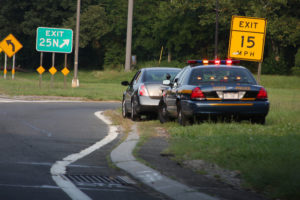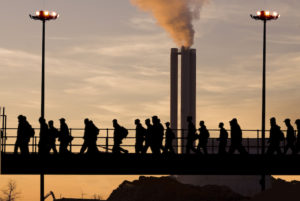
The ACLU sues Los Angeles for imposing mandatory curfews, the Supreme Court rejects a church’s challenge to California’s stay-at-home orders, and more…
IN THE NEWS
- The American Civil Liberties Union of Southern California filed an emergency lawsuit on behalf of Black Lives Matter Los Angeles and several individuals to challenge the nightly curfews imposed by Los Angeles city and county. In a statement, the American Civil Liberties Union of Southern California stated that the curfews violated the U.S. Constitution by suppressing political protests and movement in the evening hours. Melina Abdullah, co-founder of Black Lives Matter Los Angeles, reportedly stated that the curfews “suppress our ability to fully mobilize and focus full attention on the true issue of concern in the protests—police violence against Black people.” The lawsuit was filed two days after President Donald J. Trump addressed the nation in response to the death of George Floyd, warning that “those who threaten innocent life and property will be arrested, detained, and prosecuted to the fullest extent of the law.”
- The U.S. Supreme Court rejected a California church’s claim that the state’s COVID-19 related restrictions on religious gatherings put an unconstitutional burden on religious freedom. The opinion, written by Chief Justice John Roberts, deferred to state officials’ “background, competence, and expertise to assess public health,” rather than the federal judiciary to make a decision on a “fact-intensive matter subject to reasonable disagreement.” The Chief Justice also disputed the claim that the restrictions on religious institutions violated the Free Exercise Clause of the First Amendment because the same restrictions apply to similar secular gatherings. Justices Brett Kavanaugh, Clarence Thomas, and Neil Gorsuch contended in a dissenting opinion that California needed to justify the difference between religious gatherings and essential services.
- President Trump issued a proclamation limiting entry to the United States for graduate students and researchers from China. The President claimed that immigration restrictions are necessary to protect intellectual property interests of the United States, such as proprietary military research conducted in graduate school programs. The proclamation authorized the Secretary of State to exercise discretion in revoking visas of Chinese graduate students currently studying in the United States. Jeffrey Gorsky, former chief of the Legal Advisory Opinion section of the U.S. Visa Office, reportedly emphasized that there are already protections in place preventing immigrant students from accessing proprietary technology and that the United States will lose a valuable talent pool if Chinese graduate students receive fewer visas.
- U.S. Senators Maria Cantwell (D-Wash.) and Bill Cassidy (R-La.) recently introduced a bill that would place limits on applications used to track exposure to the coronavirus. Enforced by the Federal Trade Commission and state attorneys general, the Exposure Notification Privacy Act would require apps to be operated or created by public health authorities and to receive express permission to collect user data, with the additional guarantee that users may delete their data at any time. The bill would also make it illegal to deny people the right to enter a public place because they chose not to sign up for an exposure notification app program. Sara Collins, policy counsel at Public Knowledge, voiced support for the legislation, urging that regulations on contact tracing applications are needed “to protect a user’s privacy, prevent data misuse, and preserve our civil rights.”
- President Trump vetoed a joint resolution intended to maintain lower barriers to federal loan cancellation for students who claim to have been defrauded by their colleges. The U.S. Department of Education rule, which will go into effect on July 1, limits the amount of time borrowers have to apply for relief and requires proof of financial harm. The President called the resolution to prevent the new rule from going into effect “misguided” and claimed it would “increase costs for American students and undermine their ability to make choices about their education in order to best meet their needs.” U.S. Senator Richard J. Durbin (D-Ill.) reportedly called the President’s veto “a victory for DeVos and the fraud merchants at the for-profit colleges.”
- The U.S. Environmental Protection Agency (EPA) announced a final rule to increase the transparency and efficiency of the certification process under the Clean Water Act as directed by President Trump’s executive order. The purpose of the final rule is to accelerate the construction of energy infrastructure projects while maintaining water standards by limiting the review of projects by states and tribes to one year. EPA Administrator Andrew Wheeler stated that the final rule would prevent the certification process from being used to “indefinitely delay or block critically important infrastructure.” Democratic lawmakers and environmental groups, however, argued that the rule will infringe on states’ rights to use the review process to protect drinking water quality and will disadvantage states with limited resources. Mark Ryan, a Clean Water Act expert and former regional counsel for EPA, reportedly predicted that “EPA will have a very hard time convincing the Supreme Court that its current interpretation of the Clean Water Act is correct.”
- The U.S. Trade Representative issued a notice of investigation into digital services taxes adopted or under consideration by several trading partners. The purpose of the investigation is to determine whether the taxes are discriminatory toward the United States and therefore warrant retaliatory tariffs. The investigation responds to a growing conflict over foreign governments implementing digital services taxes on U.S. technology companies that provide services in foreign countries without being physically located in those countries. A similar investigation determined that a digital service tax adopted by France was discriminatory. This tax resulted in a trade agreement between France and the United States after the Trump Administration proposed tariffs on French products. In bipartisan support of the announcement, U.S. Senator Charles E. Grassley (R-Iowa) and U.S. Senator Ron Wyden (D-Ore.) reportedly said, “these digital services taxes unfairly target and discriminate against U.S. companies.”
- The Internal Revenue Service (IRS) proposed a new rule clarifying how businesses may qualify for existing tax credits for carbon capture, a process that prevents carbon dioxide emissions from entering the earth’s atmosphere. Previously, investment in carbon capture was limited because the IRS standards used to prove that carbon is securely stored in the ground were not clear. The proposed rule, if finalized, would guarantee that all carbon capture projects that comply with the standard set out by the U.S. Environmental Protection Agency’s Greenhouse Gas Reporting Program Subpart RR can qualify for the tax credit. The new rule would also allow businesses to qualify under a new standard set out by the International Organization for Standardization in its Standard 27916. Industry advocates, such as the Carbon Capture Coalition, supported this initiative because it would allow more projects to pursue carbon capture while still imposing monitoring, reporting, and verification standards.
- The U.S. Environmental Protection Agency finalized a rule reducing the quantity of ethylene oxide, a carcinogenic compound commonly used in plastics manufacturing, that chemical manufacturers can release under the National Emissions Standards for Hazardous Air Pollutants. Ethylene oxide was the subject of a recent critical report by the agency’s Office of Inspector General and was also at issue in a recent lawsuit related to worker exposure during medical equipment sterilization. The agency reported that the new standard dramatically reduces cancer risk from this class of chemicals and that more than two hundred industrial sites will be affected. Emma Cheuse, an attorney at EarthJustice, reportedly criticized the new rule, saying that the agency chose the most lenient standard among those considered and should have adopted a more stringent standard to protect against ethylene oxide leaks in the future.
WHAT WE’RE READING THIS WEEK
- In an article for the Yale Law Journal, Monica C. Bell, associate professor of law and sociology at Yale University, argued that the tense relationship between police forces and the communities they serve is due to legal estrangement rather than illegitimacy. Bell defined legal estrangement as a theory of “detachment and eventual alienation from law’s enforcers,” resulting in poor communities of color believing that “the law operates to exclude them from society.” Using insights from this theoretical framework, Bell proposed reforms that could lead to the cultural change necessary to overcome legal estrangement. Bell suggested restructuring police wages, consolidating police districts, implementing transparency measures, democratizing policing, and fundamentally reconsidering the institutional role of police in society.
- In a feature for the New York Times, Emily Bazelon, a lecturer at Yale Law School, examined the obstacles of expanding vote-by-mail to make voting safer during the COVID-19 pandemic. Bazelon analyzed Wisconsin’s 2020 primary to note the expected challenges for the November general election. Bazelon argued that voting by mail poses significant logistical problems, especially when states compete for the supplies, machinery, and promotional resources necessary for vote-by-mail and especially amid partisan opposition to expanding access to vote-by-mail.
- In an article for the Virginia Law Review, Brandon Garrett, professor at Duke University School of Law, and Seth Stoughton, professor at University of South Carolina School of Law, argued that more stringent rules are needed to limit when police may be authorized to use lethal force. Garrett and Stoughton argued that the subjective analysis espoused by the U.S. Supreme Court does not provide a sufficiently bright-line rule on when lethal force is allowed. They also reported that many of the 50 largest policing agencies in the United States lack guidance on accepted policing tactics such as de-escalation and the use of verbal warnings. Finally, Garrett and Stoughton advocated that the Supreme Court adopt a new Fourth Amendment analysis which would scrutinize actions taken by police before the moment force was used, consider whether officers adhered to their training, and generally compare officer behavior to accepted modern policing tactics.
FLASHBACK FRIDAY
- In a 2019 essay for The Regulatory Review, Jeff Kosseff, an assistant professor at the Cyber Science Department of the U.S. Naval Academy, described the controversy around Section 230 of the Communications Decency Act. Section 230 protects online platforms from liability for user content and is subject to criticisms that it either does not moderate companies enough or that it moderates them too much. As “online platforms play an increasingly central role in daily life,” Kosseff emphasized that any modifications to Section 230 must be evaluated by a fact-finding commission composed of all relevant stakeholders. A revision of Section 230 determines “how we want the internet to look for the next 20 years.”



